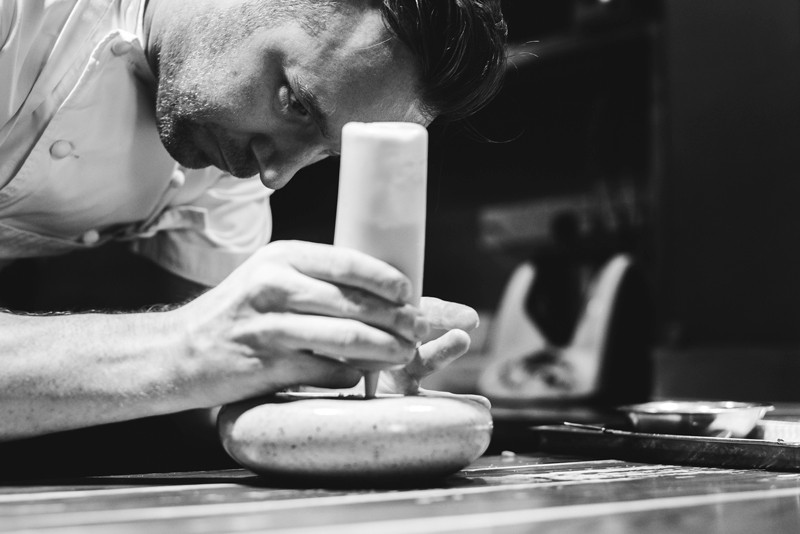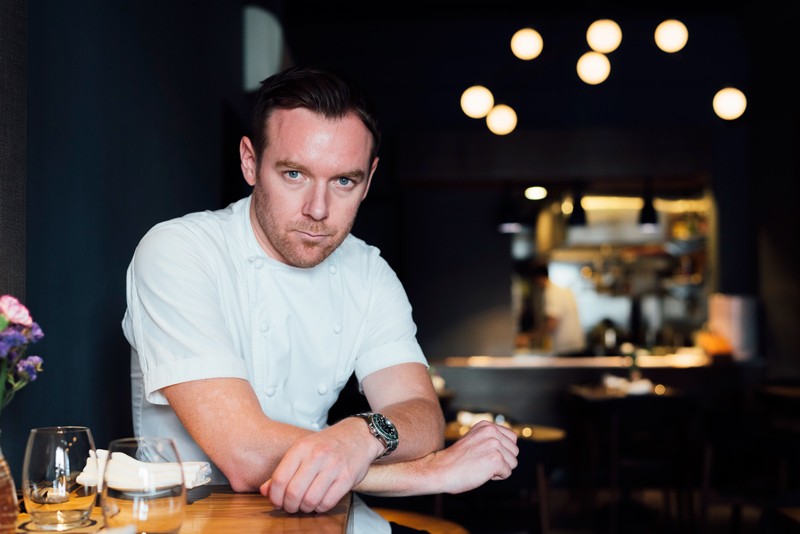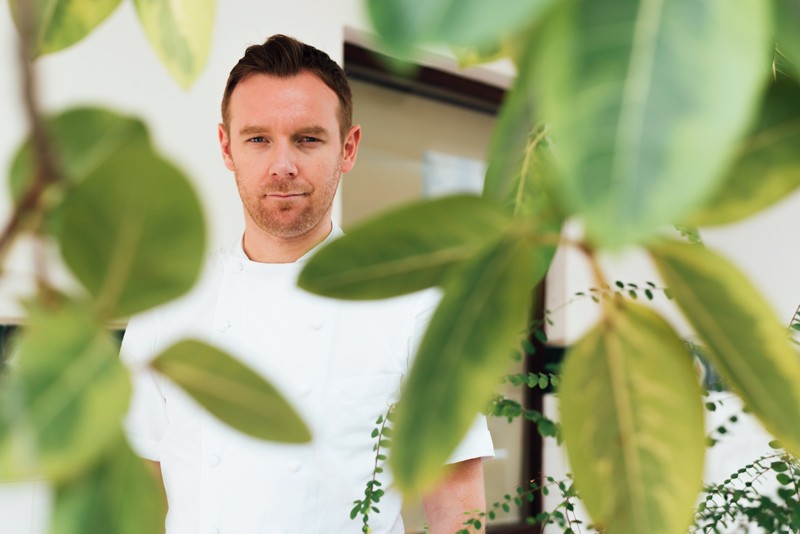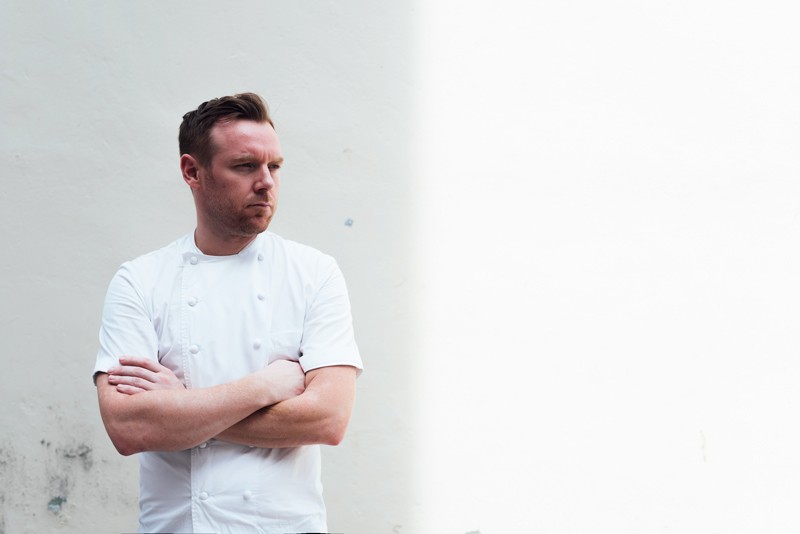Andrew Walsh: On His Terms
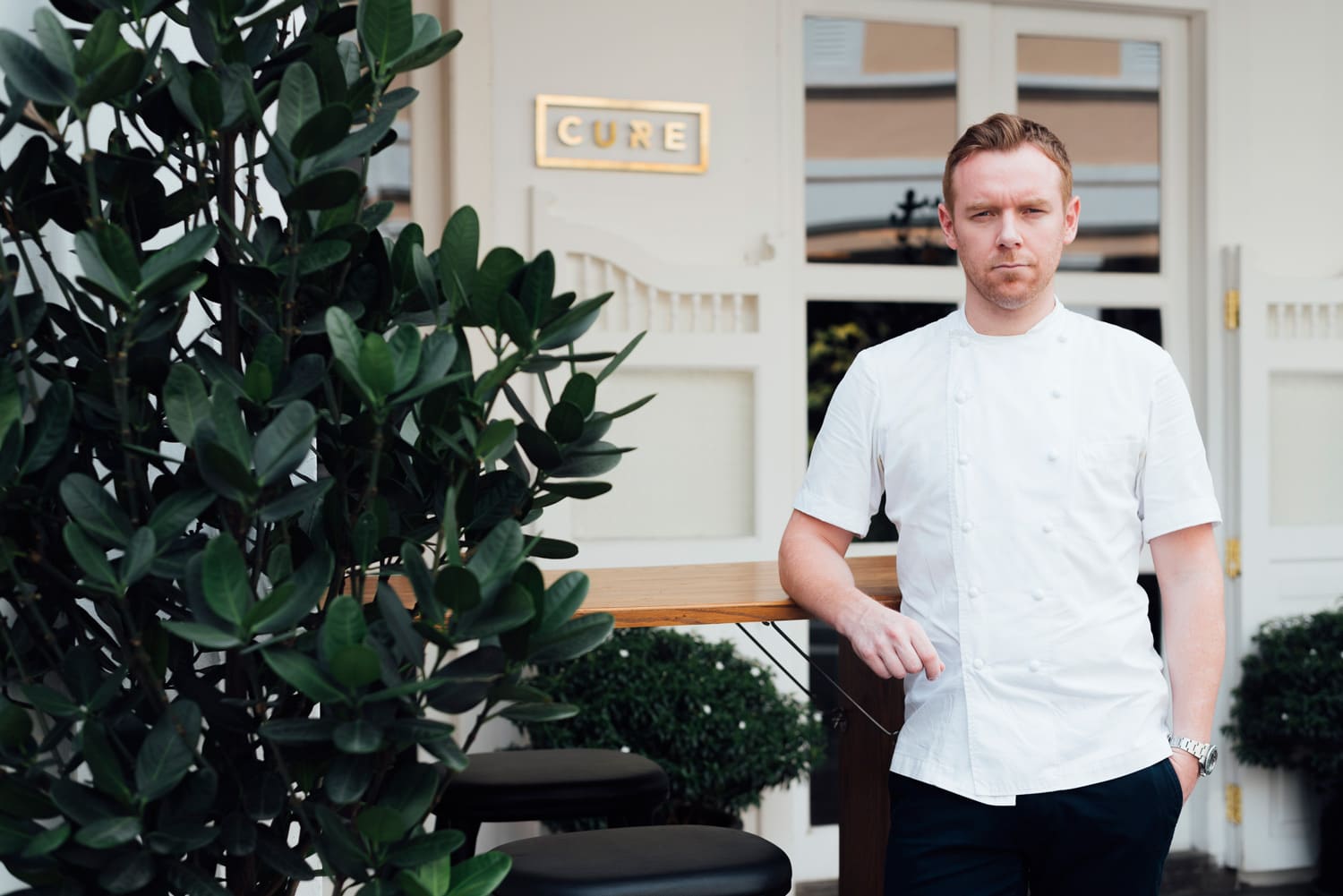
I’m hovering outside Cure on Keong Saik Road, waiting for the last of the weekday lunch crowd to leave before heading in to meet with its chef and owner, Andrew Walsh. As the final patrons straggle out the door in a procession of shiny leather brogues and nattily-cut suits, I peer through the window and inadvertently meet the eye of a staff member polishing glasses from behind the bar. What happens next catches me by surprise. Instead of stony-faced indifference and a swift, avoidant glance, Chung Hau (I later learn his name) offers me one of the widest and most genuine smiles that I’ve ever seen from a local waitstaff. I am momentarily floored. Such a pleasant welcome, even before I’ve entered the restaurant is a striking contrast to the perfunctory sullenness that one might expect from service staff in Singapore. My curiosity is piqued. I’ve read from articles that Andrew is rigorous about managing even the finest details of his business. Cure’s staff are only allowed to use a single, standard-type pen when taking orders to ensure a seamless service experience for diners. This punctilious professionalism becomes evident during our interview when Andrew shows me the draft of some artwork that he plans to have painted onto the restaurant walls. Staring intently at the image on his phone, he quickly but firmly declares it to be “too dark” and in need of revision. He clearly runs a watertight ship as Cure’s creative and business leader, and even as we speak, the staff around us are never still—working cheerily in and outside the gleaming open-plan kitchen, preparing for the upcoming dinner service. Every point and element in the restaurant indicates to me that the exemplary attitude I encountered at the door is no fluke. Andrew’s fastidious attention to detail is something that he’s learnt from working as 2nd-in-command to Jason Atherton of London’s Pollen Street Social. He’s spent half a lifetime building a career spanning across top-class kitchens worldwide, and it shows in his mien. Far from the lilting cadence of Irish speech, Andrew’s sentences are punctuated by hard, sharp and short pauses, not unlike the brief but essential, pared-down speech of professional kitchen patois. You get the sense that he’s never really “out of the kitchen”, so to speak, and he confirms my suspicion. “I never stop going. Even when I’m off, I’m always thinking about work.” Although Andrew is buzzing with caffeine and bold energy, he mellows as we move away from the hectic lunch scene. Unexpectedly patient and generous in conversation, he candidly shares with me his thoughts on the restaurant industry, service standards and dishes out advice for young aspiring chefs.
TEO REN FENG: Is there anything that you absolutely refuse to eat?
ANDREW WALSH: I can’t eat balut (the Filipino egg with the half-formed embryo). That’s just crazy. I’ve seen people eat it, and I chickened out. I like my eggs scrambled on toast or fried with a little bit of truffle on top.
REN FENG: What’s the most bizarre taste you’ve ever encountered?
ANDREW: I encountered my first bizarre taste when I worked at Thornton’s, a Michelin 2-star restaurant in Dublin. It was a simple terrine of truffle and foie gras, but it made me realise just how amazing flavours could be with the right chef, skill and environment. That’s when I knew straightaway, where I wanted to be in my career.
REN FENG: You quit school at 16 to train in the kitchens. How would you compare your education with going to culinary school?
ANDREW: It’s better for me. I feel culinary schools spoon-feed you too much and kitchens are hard environments. Schools are great for the basics but one also needs to learn the intensity, hours, drama and frustrations of kitchen life.
REN FENG: Doesn’t it help to have a name-brand school in your résumé?
ANDREW: Yes. And I think a lot of chefs want to be fast-tracked to the top of the fame-game or whatever, right? School is good if you get the right education. Otherwise, get into a good, proper kitchen and become skilled.
REN FENG: About the fame-game, we’re seeing an age of celebrity chefs. Do you think chefs are now entertainers too?
ANDREW: It’s very much part of the game now. Guests want to see you when they visit your restaurant and get a hello. You have to go out there to shake hands and toast them on their birthdays because they want that. But I became a chef to cook and I would like my dishes to speak for themselves—that’s my first priority. The rest is secondary.
REN FENG: Singapore’s service industry has a bit of a poor reputation. What is your take on this?
ANDREW: The service industry here lacks character. It’s called the “Art of Service” in Europe and we invest in it as a career. People start off as commis, washing, polishing glasses and all that before working their way up. You do your time and apprenticeship learning from different restaurants and styles because it’s imperative to running a restaurant. At the top of their game, restaurant managers and maître d’s have their own restaurants or are head of restaurant groups, earning a few hundred thousand a year, which is a great salary in many professions. Here, it’s still considered a low-skills job and that is holding it back. There needs to be an education system too—from the government to restaurateurs—we have a duty to educate and help staff create a career.
REN FENG: Where was the best service you’ve experienced?
ANDREW: The best service I’ve ever received was in Narisawa, Japan. The timing and elegance were impeccable: you did not notice the staff at work, which is probably the best compliment in terms of service. Your water is filled, and you don’t notice it being done—it's just like a magic trick. It’s an art and the Japanese have it to a “T”. Their taxi drivers wear white gloves and when you go into 7-11, you’re greeted politely—they take pride in what they do.
REN FENG: How important is service as compared to the food in a restaurant?
ANDREW: Extremely, extremely important. They’re equal. You can’t go to a restaurant and have good food with bad service. There’s a saying that goes, “You can forgive bad food—it is okay with good service. But you can’t forgive bad service.” The service team are the front of a restaurant, but I do have an open kitchen where I make my chefs bring out the food so that they're part of the service experience.
REN FENG: Does this have to do with a shortage of manpower?
ANDREW: It’s influenced by a shortage in manpower and the way the world’s economy is now, and also because of how stuffy and pretentious some restaurants are. Bistronomy really began when we had the financial crisis in Europe and America about 10 years ago. There are a lot of great chefs out there who can’t afford fancy addresses or views. So with bistronomy, you get the precision and technique of fine dining food—still using the best ingredients—just in a more accessible environment, at a better price point. It’s not just for special occasions like a birthday or anniversary. You can frequent the restaurant more than once or twice a year.
REN FENG: It’s more forgiving on the pocket?
ANDREW: Exactly. A lot of this is happening in East London, Shoreditch. You’ve got Lyle’s, Clove Club, Septime in Paris where they’ve pulled it back—no white tablecloths or formality, it’s just great food and service. That’s what dining should be about, but you get a lot of restaurants where the food and service are compensated by the view, location or wine list.
REN FENG: Is bistronomy back-to-basics fine dining?
ANDREW: There is a time and place for fine-dining—I still enjoy it myself, but I want to showcase food that can be Michelin-star quality in an environment where you don’t have to speak softly and be pressurised by a wine list that has 20 pages. We are more light and fun. Bistronomy is new to Singapore and people don’t understand the concept yet. Fine dining here is still all about white tablecloths and chandeliers hanging round every corner. There must be 10 restaurants doing linguine with caviar and uni on top. It’s great and all. . . but affordable eating and more creative environments are what’s next.
REN FENG: Bistronomy sounds like a sustainable plan.
ANDREW: Very sustainable. There are a lot of restaurants out there that are just way too expensive. They can blame it on imports, but I import my ingredients too. The fact is, a lot of it is just high rentals.
REN FENG: Singapore has very little natural produce. How does this factor into your food?
ANDREW: You’re paying for air miles. A lot of my ingredients come from Europe: French, British and Irish produce, simply because I have always used them and I know that they provide good rearing and quality livestock. The seafood we use is sustainable too.
REN FENG: You might be able to do more elsewhere, like say, Australia, which has fresh native produce.
ANDREW: For sure. Sometimes when you have pristine, fresh produce at your doorstep at 7 in the morning, it doesn’t need much. I do miss that but everything is quickly accessible now, so we are able to get fresh produce. I reject anything that I’m not happy with and everything I put on a plate is not far off from Australia or London. I came from that kind of environment previously and my challenge now is to succeed in Singapore and Asia. We also try to do everything in-house, from churning our own butter and making our own bread, to the little complimentary petit fours and pre-desserts, which require a lot of work.
REN FENG: Doesn’t that work up to a higher price?
ANDREW: Yes. I could easily add on another $50 per head, but I’m in tune with my margins and I’ve reasonable rent so I can afford to give my guests more. My staff costs are manageable since we don’t have a whole brigade; our 10 staff work hard putting in long hours to create a price-friendly environment.
REN FENG: What are your monetary goals?
ANDREW: I’m not in this for the money alone. Although I would like to build a future for myself and my family, I won’t sacrifice quality, product or skill for it. I’m also a firm believer in reinvesting, so I spend money to make more. For example, after the first 6 months here, we bought new crockery. The next 6 [months], new art. In January, an artist is coming in to do a piece on the walls. I want my guests to always see something new when they come back. I have goals like having a couple of restaurants, but I believe the money for that will come sooner or later. My focus for now, is to make a name for ourselves.
If critics or influential media come, they get treated with the same effort and care, just like every other guest.
REN FENG: Do you trust that somehow all your effort and work will speak for itself?
ANDREW: Sometimes, no. I’ll be honest, it’s about connections: who knows who, who’s related to who and who’s dined with this or that person. There are politics, favouritism and quid pro quo, just like any other industry. But I don’t get distracted by it. If critics or influential media come, they get treated with the same effort and care, just like every other guest.
REN FENG: What do you think of food bloggers? Do you feel their role is similar to food critics?
ANDREW: No. Nowadays, everyone seems to think that they are a critic and qualified to give chefs advice just because they’ve read a few articles or can take a picture. We work 16 to 18 hours a day in a high-pressure environment. It’s a hard job, and we sometimes don’t get to see friends and family, but we love what we do. We push ourselves more than anyone needs to push us, while bloggers just sit behind their laptops. . .
REN FENG: Like “keyboard warriors”?
ANDREW: Exactly. How about I start a blog critiquing how they blog? If you want to be a food blogger, try doing a cooking course or spend some time in the kitchen—don’t just blog about it. You’re welcome to talk and I’ll sit down and educate you, but you’re not here to score marks.
All that matters is when I get home every night, I know I’ve given my all at work and that I’ve cooked to the best of my ability.
REN FENG: So you don’t like anyone blogging about your food?
ANDREW: I’m on the fence. Some are good and know what they’re all about, but a lot of them are just blogging about stuff they don’t know. Yes, they might have a lot of connections, likes and followers, but I don’t pander to that or lose sleep over awards. All that matters is when I get home every night, I know I’ve given my all at work and that I’ve cooked to the best of my ability. I will never stop trying to improve and I know my team shares the same sentiment. People can write what they want, but as we say back home: “Today’s news is tomorrow’s fish and chips paper.” Cure has gotten great reviews, but those are in the past. We’re always looking to the future.
REN FENG: You’ve stressed the importance of remaining current and staying one step ahead of the game. Can you describe your process when it comes to creating menus? 12 new menus a year mustn’t be easy.
ANDREW: It’s very progressive, right? I spend a lot of time on it. I pick what’s best in season for the vegetables and meats, choose the right cooking technique and then decide on the texture, umami and balance of the dish. But sometimes there’s no method. Ideas just pop into my head and I will work on it straightaway.
REN FENG: For example?
ANDREW: I was having breakfast one morning, and out of boredom, I started sketching my granola. Next, I flipped over the paper and started to work on creating a dish. Looking at the granola’s messy mix, its big chunks of apple and banana, I thought: Why don’t I create granola, but use autumn vegetables instead? So I came up with a dish using pumpkin, sweet potato and celeriac and added pumpkin seeds, pine nuts and almonds too. For the “fruit”, I used frozen pearls of raspberries and had a scoop of Burrata cheese curd with a sage-infused milk gel to replace the milk or yoghurt.
You’ve got to learn to be a businessman or else you won’t have the platform to be an artist.
REN FENG: Do you see yourself as a businessman or an artist?
ANDREW: To survive in this industry is really tough. You’ve got to learn to be a businessman or else you won’t have the platform to be an artist. I’ll always be a chef and artist, but even now I’m learning how to manage the accounts.
REN FENG: Would you welcome the opportunity to work with a limitless budget?
ANDREW: Yes, I would. I’d use the best of everything—caviar with lobster, foie gras, truffle, etc. It’d be super fun, but honestly, it’s more challenging when you’re working with a budget. The real skill of a chef is working with lesser cuts and showcasing it. There is goodness to be found in every ingredient. I have chicken wings on my menu, and you’d think, “Oh, that’s something that you can get in KFC.” But what we do is brine and confit the wings, pop out the bones and stuff it with a chicken and foie gras mousse before roasting them. We challenge ourselves in terms of what a dish is supposed to be rather than putting truffle shavings onto a dish. You can easily make something amazing out of lobster and caviar, but give a chef lamb’s heart and cod’s roe and see what he makes out of it.
REN FENG: Do you see yourself as an ambassador for Irish cooking?
ANDREW: Yes, of course. Scandinavia has been in the spotlight recently, so why not Irish and British food? Showcasing a cuisine means using a country’s produce, so Cure uses a lot of British and Irish ingredients. Beef, oysters, lamb and salmon. . . we try to work within the boundaries of natural Ireland.
REN FENG: You’ve spoken about working in highly-competitive environments where you had to deliver with no excuse, in spite of sabotage and bullying. Are you also a “no excuses” chef with your staff?
ANDREW: Yes.
Nowadays, it seems there are many people opening up restaurants with romantic ideals. They don’t know anything about restaurants and you can tell when you walk in.
REN FENG: What’s your leadership style like?
ANDREW: Firm and fair. I’m firm, but I look after my guys too; they have good working hours and staff outings. They’re an amazing team but if someone steps out of line, I will let them know. We’re all here to do a job together, so no one is bigger than the restaurant, not even myself.
REN FENG: What advice can you give to the younger generation who are interested in entering your field?
ANDREW: Nowadays, it seems there are many people opening up restaurants with romantic ideals. They don’t know anything about restaurants and you can tell when you walk in. What happens then is that they look for people to fill the roles and chefs get fast-tracked. They don’t get their foundations right and are not doing proper time in different sections of the kitchen, learning under the right chefs. That’s all very important because once you reach the level of running your own business, there is no going back. From doing accounting and rosters, to meeting suppliers, media and even the repairman, it’s a squeeze and you find that you spend much less time at the chopping board. So I would say: Enjoy your time as the chef de partie or sous-chef. Really get to know the role and work on expanding your vocabulary of dishes and cooking styles. Be patient and don’t be in a rush. I’ve seen guys who jump right in and burn out in 1 or 2 years because they can’t handle all the pressure. At the right time and place—when you get a good feeling for it, like I did—then you go for it. Don’t do it because someone approaches you with money or because your friends say that you’re amazing and should open your own restaurant. There are too many of those places around. Do it because you want to give people a sense of who you are. There’s no better feeling than people coming to your restaurant for your food.
REN FENG: In some sense, Cure is an extension of you. Can you describe the “Andrew Walsh” brand?
ANDREW: Cure is my first restaurant and I’ve worked towards it. We’re not backed by a big hospitality group so I’ve done it in my style and on my terms. So yes, it is an extension of me, but it is also an extension of all my staff here, from my dishwasher to our manager. This is a result of all their hard work and eagerness to keep pushing forward. It’s a team effort. This place is also an extension of our guests who contribute to the vibe and energy. Cure has its own identity and brand while I’m just a chef. Andrew Walsh is not a brand. I have aspirations and ambition but I do not want to be branded and there’s nothing brand-name about me. I’m just a simple guy from the Irish countryside who likes to cook.
REN FENG: That’s actually a great brand story.
ANDREW: [laughs] Yeah.
****
Edited by Wy-Lene Yap
